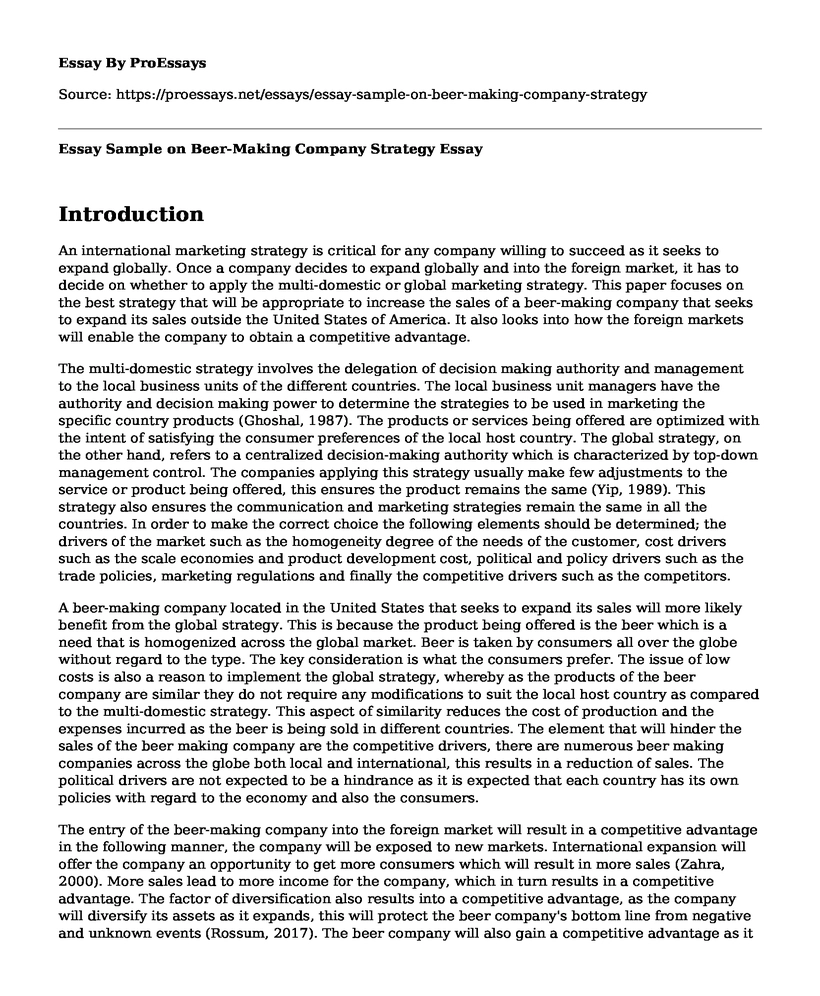Introduction
An international marketing strategy is critical for any company willing to succeed as it seeks to expand globally. Once a company decides to expand globally and into the foreign market, it has to decide on whether to apply the multi-domestic or global marketing strategy. This paper focuses on the best strategy that will be appropriate to increase the sales of a beer-making company that seeks to expand its sales outside the United States of America. It also looks into how the foreign markets will enable the company to obtain a competitive advantage.
The multi-domestic strategy involves the delegation of decision making authority and management to the local business units of the different countries. The local business unit managers have the authority and decision making power to determine the strategies to be used in marketing the specific country products (Ghoshal, 1987). The products or services being offered are optimized with the intent of satisfying the consumer preferences of the local host country. The global strategy, on the other hand, refers to a centralized decision-making authority which is characterized by top-down management control. The companies applying this strategy usually make few adjustments to the service or product being offered, this ensures the product remains the same (Yip, 1989). This strategy also ensures the communication and marketing strategies remain the same in all the countries. In order to make the correct choice the following elements should be determined; the drivers of the market such as the homogeneity degree of the needs of the customer, cost drivers such as the scale economies and product development cost, political and policy drivers such as the trade policies, marketing regulations and finally the competitive drivers such as the competitors.
A beer-making company located in the United States that seeks to expand its sales will more likely benefit from the global strategy. This is because the product being offered is the beer which is a need that is homogenized across the global market. Beer is taken by consumers all over the globe without regard to the type. The key consideration is what the consumers prefer. The issue of low costs is also a reason to implement the global strategy, whereby as the products of the beer company are similar they do not require any modifications to suit the local host country as compared to the multi-domestic strategy. This aspect of similarity reduces the cost of production and the expenses incurred as the beer is being sold in different countries. The element that will hinder the sales of the beer making company are the competitive drivers, there are numerous beer making companies across the globe both local and international, this results in a reduction of sales. The political drivers are not expected to be a hindrance as it is expected that each country has its own policies with regard to the economy and also the consumers.
The entry of the beer-making company into the foreign market will result in a competitive advantage in the following manner, the company will be exposed to new markets. International expansion will offer the company an opportunity to get more consumers which will result in more sales (Zahra, 2000). More sales lead to more income for the company, which in turn results in a competitive advantage. The factor of diversification also results into a competitive advantage, as the company will diversify its assets as it expands, this will protect the beer company's bottom line from negative and unknown events (Rossum, 2017). The beer company will also gain a competitive advantage as it will obtain a first-mover advantage which enables the company to develop a better brand awareness campaign.
International expansion requires key consideration of the marketing strategies to be applied as the business entity expands. For this beer-making company seeking to expand past the borders of the United States of America, the best strategy to be applied is the global strategy as this product is homogenized and the cost incurred in its production and sale is less as compared to the multi-domestic strategy. The beer-company will gain a competitive advantage due to diversification and access to new markets.
References
Ghoshal, S. (1987). Global strategy: An organizing framework. Strategic management journal, 8(5), 425-440.
Rossum, J.-E. v. (2017, December 18). 5 benefits of international expansion. Retrieved from The Business Journals: https://www.bizjournals.com/bizjournals/how-to/growth-strategies/2017/12/5-benefits-of-international-expansion.html
Yip, G. S. (1989). Global strategy... in a world of nations? MIT Sloan Management Review 31, no. 1, 29.
Zahra, S. A. (2000). International expansion by new venture firms: International diversity, mode of market entry, technological learning, and performance. Academy of Management Journal, 43(5), 925-950.
Cite this page
Essay Sample on Beer-Making Company Strategy. (2022, Nov 17). Retrieved from https://proessays.net/essays/essay-sample-on-beer-making-company-strategy
If you are the original author of this essay and no longer wish to have it published on the ProEssays website, please click below to request its removal:
- Logistics as a Function of the Supply Chain Essay
- Essay Sample on Role of End-Users in Creation of a Contingency Plan
- Charity: A Non-Profit Organization for Welfare of Needy People - Essay Sample
- How Ombudsman Ensures Conflict Resolution in Organizations - Essay Sample
- Navigating Change: 6 Key Roles for Achieving Success - Essay Sample
- Paper Sample on Designing Training Programs: Engaging Consultants for Maximum Utilization
- BI Organizations and Transforming Businesses - Free Paper Sample







